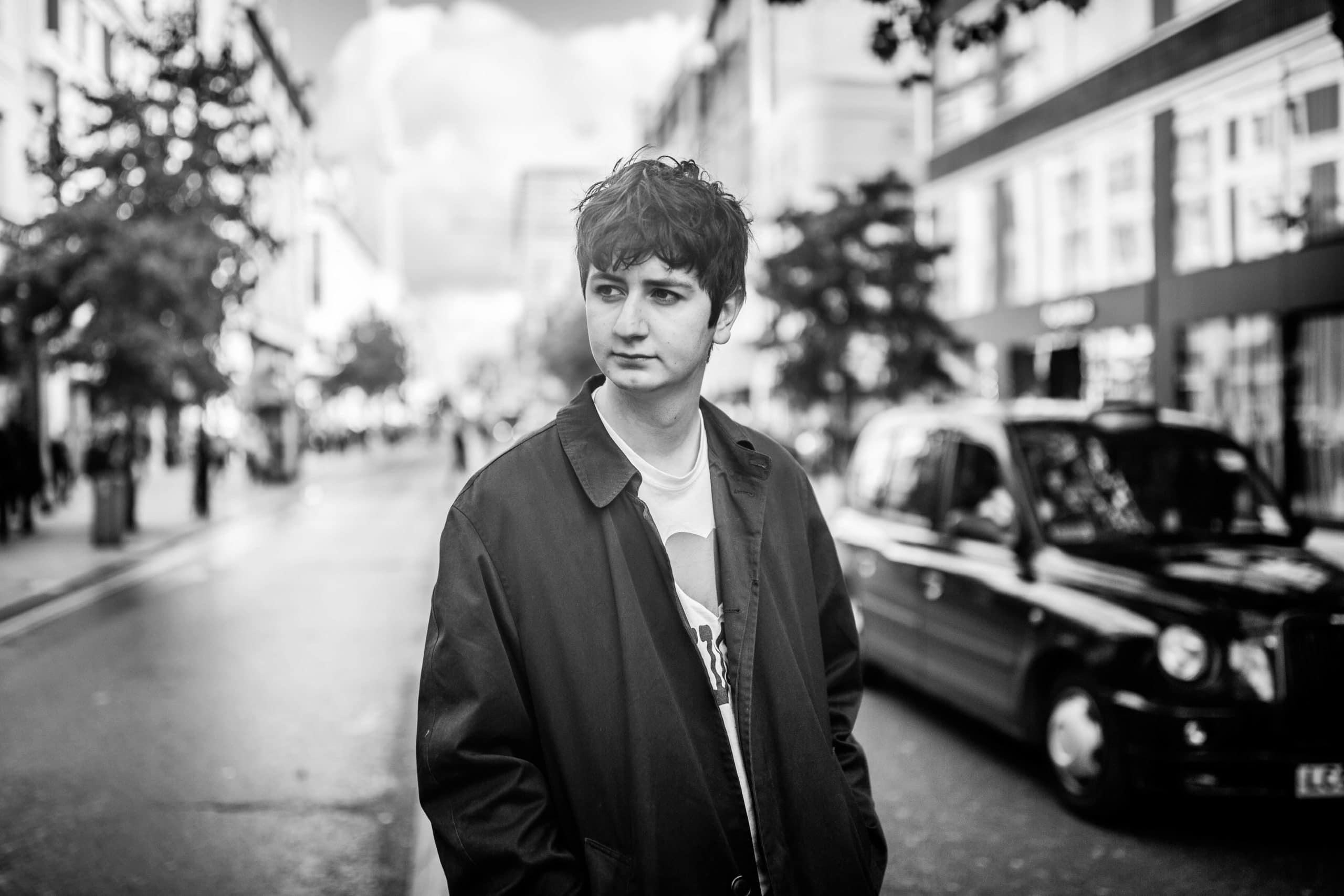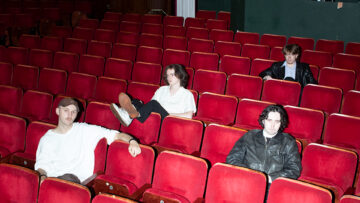
All-round artist and record label co-founder Marco Pini shares his thoughts on trying to remain authentic in the throes of London’s current, saturated music scene and his most recent EP, J.L. Hooker Love Pleasure Forever.

LODGED between Deptford’s main high street and the River Thames, the Dog and Bell pub is in fact listed as the Royal Marine – a mid-19th century name-change intended to attract more respectable, wealthier Marines housed in the local dockyard.
Yet, refusing to be anything other than true to itself, ‘Dog and Bell’ are the words plastered proudly on its front. A similar barefaced honesty is echoed in the mindset of the man I meet there.
Marco Pini is dark-haired, pale and interesting. Born in Ladbroke Grove, the twenty-two year-old’s artistic outlet also takes on multiple names. Glows is his most significant, under which he has produced four intricate, atmospheric, sample-based singles and released an EP. (GG Skips is his other production moniker, “just to create some sort of separation with my personal life,” he explains).
As if still pondering a particular musical element, he’s economical with his eye-contact, but tells me, with boyish excitement, about the process behind the EP: J.L. Hooker Love Pleasure Forever.

By no means a Blues-style sound, nevertheless one of its overarching themes “is Blues musicians, the modern Blues, depression in male musicians and this ‘sadboy’ thing; everyone’s very open about stuff now, in a way that was similar to the Blues musicians singing constantly about ‘Mississippi Blues’. But this modern ‘Blues’ is a mood – it’s not quite defined ever. It’s not ‘I’m sad’, it’s ‘the Blues’, like a physical thing.”
“I was really interested in that mythology, in ‘the Blues’ being this unknown, secret force that comes through all its songs. It’s a thing that has come about because of everything currently going on in the world.”
Everyone’s very open about stuff now, in a way that was similar to the Blues musicians singing constantly about ‘Mississippi Blues’
“All young people, not just men, everyone’s depressed basically and they don’t really know why. I was thinking about a global Blues for our generation.”
Adding another strand of thought to underpin his creative reasoning – sampling and meshing ideas together in the same vein in which he produces his music – Pini continues: “I was also reading a lot about ‘psychogeography’, the study of the human’s relationship to its environment, mainly in cities and how we walk through them.”

Credit: Darius Williams
“A lot of writers have done that – William Blake, [Charles] Bukowski – where it’s a sort of lost person walking through, with no real purpose, just moving through an environment. When I make the songs, I listen to the loops and I walk.”
It’s romantic to regard Pini in such a way: as a lost, wandering artist, piecing together samples and visuals for the eye-pleasing videos that accompany his music. Especially when he points out that the name GG Skips was chosen to sound like a Blues artist, which would figure him as a London-based, 21st-century Robert Johnson of the experimental scene (Johnson being someone Pini read about and became fascinated with).
The name GG Skips was chosen to sound like a Blues artist, which would figure him as a London-based, 21st-century Robert Johnson of the experimental scene
In actuality though, Pini has already established himself in far more concrete and impressive ways since co-founding the record label and events collective Slow Dance – which Glows releases from – almost five years ago. Initially a zine, the label grew, putting on nights and playing host to acts from the current emerging south London scene – ‘just purely the people we were hanging out with’ – which includes Goat Girl, black midi, and the lead singer of Sorry (who Glows now tours with), Asha Lorenz.
“We’ve got a lot of s*** on,” Pini puts it succinctly. “It’s stressful, but great – Slow Dance will be doing a residency at the Royal Academy and I’ll be playing with Sorry at SXSW Festival in America next year.”

Undoubtedly, Pini is making his mark. And he aptly has flags-in-hand in one of his recent video releases, ‘Afterthought’, as if to signify such a stamp on artistic territory. “The flags are very important. I tried to stop drinking, so I tried to find a physical activity, which would take me ages.
“I like them as well, in terms of folklore or tribalism. I saw them as signalling a procession about nothing. It’s kind of funny: people were looking at us [when shooting the video], thinking we were marching about something and it wasn’t really about anything.”
I like the flags in terms of folklore or tribalism. I saw them as signalling a procession about nothing
And audiences in London are looking. But “can it also be a challenge,” I ask, “to be constantly creative in such a creatively-saturated city?” “A challenge for your mental health, definitely. It’s very stressful making music in London because everyone’s doing equally amazing and original stuff – it’s both inspiring but terrifying. And then you have to remember and tell yourself, “Oh yeah, I’m doing this for me.”
There lies a key gripe for any artist in a burgeoning scene: the perils of maintaining a ‘doing this for me’, authentic approach. ‘I think there’s a massive problem, in my opinion, right now, with bands and musicians being so concerned about how they’re coming across, whether it’s serious or ironic or wondering what their message is – they’re just getting themselves upset.”

“They enter into such a state of thinking, that it becomes much less about just trying to make music that you really like yourself and more about trying to make a statement about the music industry itself. And that’s not going to age well.”
“But the problem is everyone’s a hypocrite. I’m a hypocrite – we were speaking earlier about my worries over whether my music will be liked or not, and now I’m saying artists shouldn’t be saying that. And I think that comes from a mass insecurity within music; people are not completely sure whether they want their work to be seen as them, or something a bit more ‘fun’ – ‘Oh, here’s just some music that I made’ – and people are always stuck between those two.”
Everyone’s a hypocrite. I’m a hypocrite. People are not completely sure whether they want their work to be seen as them, or something a bit more ‘fun’
“It’s a difficult thing to accept the fact that, if you make music that’s completely you, people aren’t necessarily going to like it. But I think once you do that, you’re in a better position because you just don’t care. And I’m nearing there; I’m not quite there.”
His tendency to deconstruct, even our conversation, is noticeable; to play back old parts of our interview and re-examine them in order to be more honest, more authentic. It’s an attitude that listeners would struggle not to admire, at least, if they don’t already enjoy his music.
Inevitably, for this restless and engaged young artist, his phone starts alerting him to a meeting he has to attend at his nearby flat, to discuss the fifth-year anniversary of Slow Dance. We hug goodbye awkwardly and I say farewell to Marco Pini, aka Glows, aka GG Skips, from the Royal Marine, aka the Dog and Bell.




